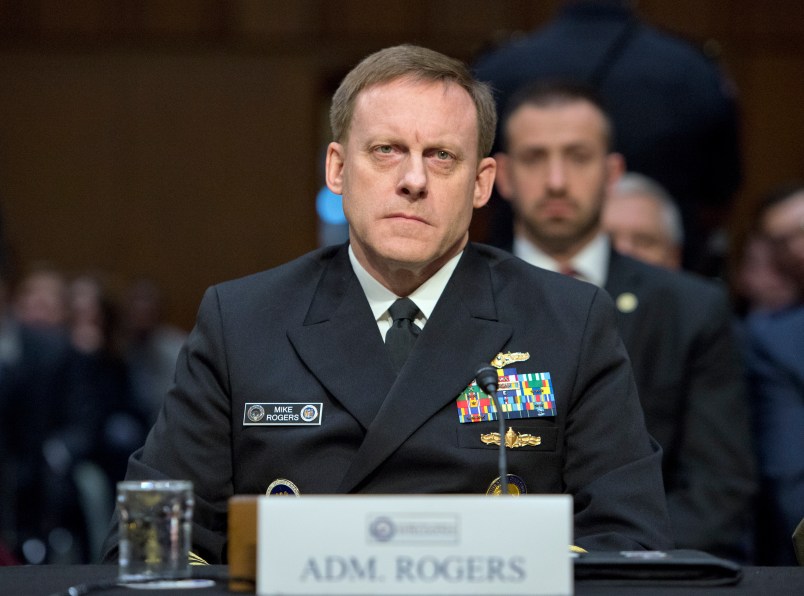At a Senate Intelligence Committee hearing Wednesday morning, lawmakers directly questioned Director of National Intelligence Dan Coats and Admiral Mike Rogers, the leader of the NSA, about recent reports that President Donald Trump asked them to intervene with the FBI to get the agency to back off its investigation into former national security adviser Michael Flynn.
Sen. Mark Warner (D-VA), the ranking member on the committee, led the first, fruitless salvo.
Rogers, responding testily to Warner’s repeated attempts to get additional details, refused to confirm or deny the reports. “I am not going to discuss the specifics of any interaction or conversations I may or — if I could finish please — that I may not have had with the President of the United States.”
He then added what sounded like a categorical denial.
“In the three plus years that I have been the director of the National Security Agency, to the best of my recollection, I have never been directed to do anything I believe to be illegal, immoral, unethical or inappropriate,” he said. “And to the best of my recollection, during that same period of service, I do not recall feeling ever pressured to do so.”
Warner tried several more times, to no avail, to get Rogers to divulge information about allegations Trump asked him to talk to Comey about easing off the federal investigation into Flynn.
“I understand your answer but I am disappointed with your answer,” Warner said, before turning his attention on Coats, who similarly demurred.
“I do not feel it is appropriate for me in a public session to breach confidential conversations between the president and myself in a public session,” Coats said, adding: “In my time of service, which is interacting with the President of the United States or anybody in his administration, I have never been pressured, I’ve never felt pressure to intervene or interfere in any way with shaping intelligence in a political way or in relationship to an ongoing investigation.”
In limiting his comments to attempts at “shaping intelligence,” Coats did not contradict reporting by the Washington Post that President Trump asked for his help in intervening with former FBI Director James Comey to convince him to back off the Flynn investigation.
Sen. Marco Rubio (R-FL) pointed out as well that the two men both testified they were not “pressured” by the White House, and tried to pin them down on whether they were “asked” for the reported favor. They declined to answer his queries.
Sen. Ron Wyden (D-OR) then tried to grill the panel on whether they had any memos or documentation of their conversations with the president—as former FBI Director Comey reportedly does. Coats responded bluntly, “I don’t take any notes,” sparking a round of nervous laughter in the hearing room. Rogers similarly claimed he does not have records of their conversations and declined to elaborate.
After both men refused to say more, Warner expressed frustration, saying, “At some point, these facts have to come out.”
He told reporters as he left the hearing that he was “very concerned” that the witnesses appeared to be censoring themselves even though executive privilege has not yet been invoked and they have not yet spoken to special counsel Robert Mueller about the scope of his investigation and whether they would impede it by sharing information with the committee.
“We never got an answer whether there was an effort by the president to get them to move away from or downplay the Flynn investigation,” he lamented. “They could have laid all this to rest and they chose not to.”
Noting that none of the witnesses denied the Washington Post’s report alleging Trump leaned on Coats and Rogers to talk to Comey about killing the Flynn investigation, Warner added: “It seems that what type of conversations the president had about the investigation will only be given in a classified setting. But the American people deserve to know what the President of the United States asked of the leaders of our intelligence community.”
Following the hearing, Wyden vented to reporters that the intelligence community witnesses did not say “much of anything except what they wanted to in talking points.”
“When you’re talking about matters on which the president has been quite expansive, and then you say, ‘Oh my goodness, I can’t say anything,’ that’s pretty hard to reconcile,” he told reporters. “We’ve got a lot of digging to do.”










